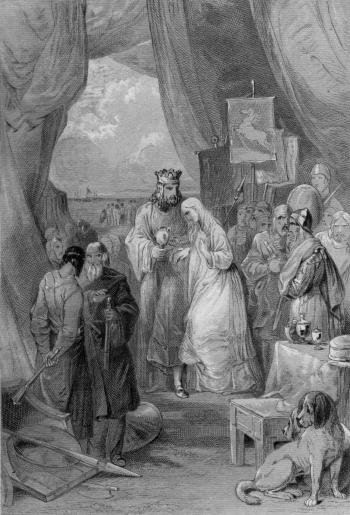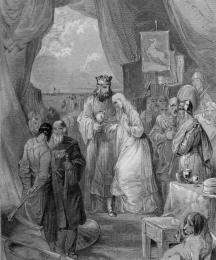
Gildas refers to a "superbus tyrannus" (proud ruler) who invites the Saxons into Britain. Bede names this figure Vortigern. Nennius tells of Vortigern's attempt to build a tower which will not stand. He is advised to sprinkle the site with the blood of a child with no father. The child—Ambrosius in Nennius's account and Merlin in the accounts of Geoffrey of Monmouth and others—saves himself by revealing the true cause of the tower's collapse: two dragons fighting beneath the foundation.
Geoffrey of Monmouth creates a picture of a wicked and foolish Vortigern whose ambition leads to the treacherous killing of a king and whose folly leads to inviting the Saxons into Britain. Geoffrey tells of Vortigern's persuading Constans, the brother of Uther and Aurelius, to leave a monastery and ascend to the throne. Thoroughly unsuited to rule, Constans gives all real power to Vortigern, who then engineers the assassination of Constans and has himself named king. Those protecting Constans’s young brothers take them to Brittany to save them from a similar fate.
The Welsh Triad 51 names Gwretheyrn the Thin (Vortigern) as one of the "Three Dishonoured Men" because he "first gave land to the Saxons in this Island, and was the first to enter into an alliance with them." According to a number of sources, his lust for Hengist's daughter Rowena causes him to give land to the Saxons. Merlin predicts Vortigern’s death after revealing the fighting dragons beneath the tower. In the chronicles, Vortigern is virtually always presented as a treacherous, ambitious, and foolish king.
While much of what is written about Vortigern in the chronicles is standard, some authors of romances and novels introduce less traditional...
Read More
Geoffrey of Monmouth creates a picture of a wicked and foolish Vortigern whose ambition leads to the treacherous killing of a king and whose folly leads to inviting the Saxons into Britain. Geoffrey tells of Vortigern's persuading Constans, the brother of Uther and Aurelius, to leave a monastery and ascend to the throne. Thoroughly unsuited to rule, Constans gives all real power to Vortigern, who then engineers the assassination of Constans and has himself named king. Those protecting Constans’s young brothers take them to Brittany to save them from a similar fate.
The Welsh Triad 51 names Gwretheyrn the Thin (Vortigern) as one of the "Three Dishonoured Men" because he "first gave land to the Saxons in this Island, and was the first to enter into an alliance with them." According to a number of sources, his lust for Hengist's daughter Rowena causes him to give land to the Saxons. Merlin predicts Vortigern’s death after revealing the fighting dragons beneath the tower. In the chronicles, Vortigern is virtually always presented as a treacherous, ambitious, and foolish king.
While much of what is written about Vortigern in the chronicles is standard, some authors of romances and novels introduce less traditional...
Read More
Dickens, Charles (1812 - 1870)
Gildas (c. 550 - c. 600)
Giles, J. A. (1808 - 1884)
Hall, John Lesslie (1856 - 1928)
The Calling of Hengist and Horsa - 1899 (Author)
The Death of Horsa - 1899 (Author)
The Lady Rowena - 1899 (Author)
The Landing of Hengst and Horsa - 1899 (Author)
The Death of Horsa - 1899 (Author)
The Lady Rowena - 1899 (Author)
The Landing of Hengst and Horsa - 1899 (Author)
Ireland, W. H. (1777 - 1835)
Milman, H. H. (1791 - 1868)
Milton, John (1608 - 1674)
Sutton, John William (1976 - )
Thelwall, John (1764 - 1834)




